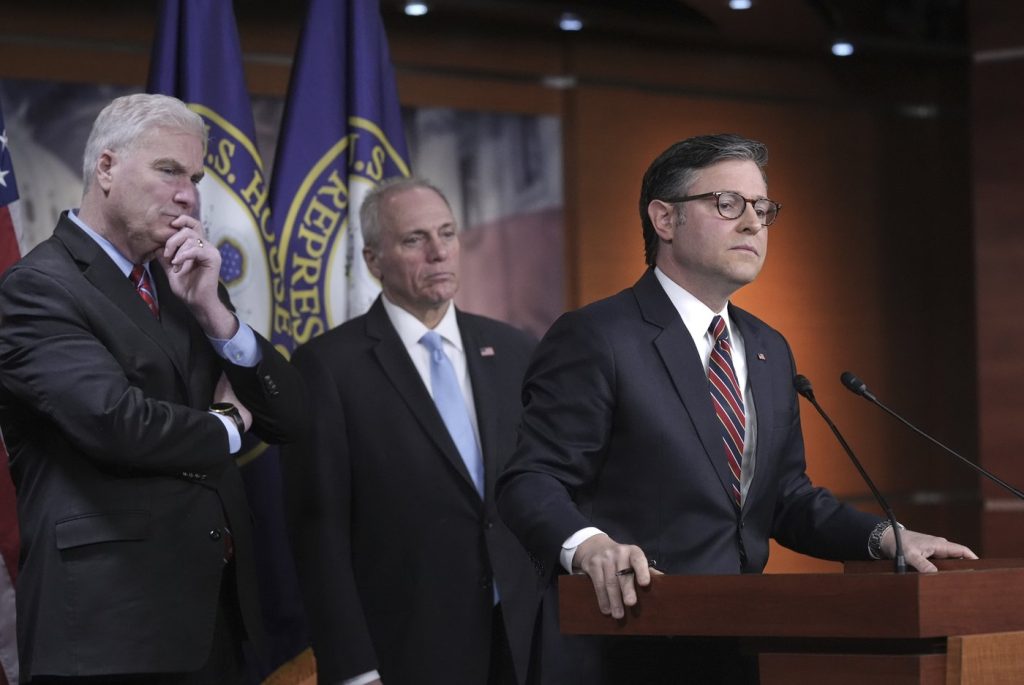WASHINGTON (AP) — The Republican Party is facing a pivotal moment as it defines its economic policy for the upcoming Trump administration. Key questions arise regarding its direction: Is the GOP committed to traditional free-market principles, or is it evolving into a more populist party shape? Moreover, will the party maintain its long-standing no new taxes pledge, or will it consider taxing the wealthy, as suggested by former President Donald Trump?
As House Speaker Mike Johnson and Republican lawmakers work to create a significant economic package—dubbed Trump’s “big, beautiful bill” of $4.5 trillion in tax breaks and $1.5 trillion in spending cuts—the internal party divisions become increasingly pronounced. This ongoing transformation aims to resonate with the working-class coalition that supported Trump during his presidency.
Historically, the Republican Party has been characterized by a commitment to lower taxes and limited government. However, modern influences challenge these traditional tenets. Notable figures like former House Speaker Newt Gingrich and anti-tax advocate Grover Norquist have remained vigilant defenders of fiscal conservatism. In contrast, a newer, neo-populist faction, closely aligned with Trump, promotes the importance of policies reflecting the economic needs of average Americans.
As GOP leaders navigate this complex landscape, they face pressures on various fronts. Some Republicans advocate for steep spending cuts to avoid exacerbating the current $36 trillion national debt, while others are hesitant to enact heavy reductions in popular programs such as Medicaid, which serves over 70 million Americans. Recent expansions of the Medicaid program, as a result of the Affordable Care Act, have led to debates about potential cuts. Many lawmakers express the desire to target inefficiencies in Medicaid rather than dismantling its critical components.
Adding to the complexity, conversations surrounding green energy investments present additional friction. Moderate Republicans are pushing back against the potential rollback of tax credits that facilitate investment in renewable energy, which has seen growth under the Biden administration.
The discussions over the economic package intensify as different factions within the party clash over fundamental principles. About 30 Republicans argue that adhering to the foundational budget framework of $2 trillion in spending cuts is necessary to mitigate the impacts of tax cuts on rising deficits. These tax cuts, originally established by Republicans in 2017, risk adding significant costs if expanded further to include new exemptions.
In the current negotiations, Johnson is also attempting to address the concerns of a group of Republicans from high-tax regions like New York, New Jersey, and California. They demand the reinstatement of a larger state and local tax deduction, which they believe directly benefits their constituents. Their dissatisfaction with proposed modifications to this cap illustrates the ongoing tension between preserving revenue and addressing local needs.
Trump's involvement in the discussions has introduced an unpredictable element, as he oscillates between advocating for new tax rates for high earners and appearing reluctant to fully commit to more significant tax hikes. As GOP lawmakers seek to unify, they must carefully balance these competing interests while maintaining support from their base and responding effectively to the economic conditions prevailing during their time in office.
Ultimately, the outcome of this process will significantly shape the Republican Party's identity moving forward. The leadership is acutely aware of the political implications of their decisions, as they navigate the complexities of economic policy in a rapidly changing political landscape. As the party endeavors to craft a cohesive plan that resonates with its constituents, it faces the daunting challenge of reconciling its established beliefs with the emergent populist sentiments that have gained traction among its base.











